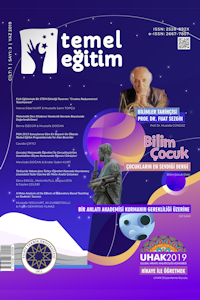Abstract
Küreselleşmenin bir sonucu olarak toplumda ve eğitim
anlayışlarında hızlı değişimler yaşanmaktadır. Bu değişimler ülkelerin eğitim
programlarına sadece akademik bilgiyi değil aynı zamanda öğrencilerin 21.
yüzyılda karşılaşabilecekleri zorluklarla başa çıkabilmeleri için gerekli olan
tutumları, davranışları, değerleri, becerileri ve yetkinlikleri de dahil
etmesine neden olmuştur. Bu araştırmanın amacı PISA 2015 sonuçlarına göre en
başarılı olan on ülkenin eğitim programlarına dahil ettiği becerileri belirlemektir.
Araştırmada nitel araştırma yöntemlerinden doküman analizi kullanılmıştır. Veriler ülkelerin ilkokul eğitim programlarında yer
alan temel beceriler ve genel eğitim amaçları ile ilgili bilgiler ülkelerin
eğitim programları ve eğitim programları hakkındaki sistemleştirilmiş veriler -Dünya
Eğitim Verileri Yedinci edisyonu gibi (World Data on Education 7th Edition
2010/2011)- kullanılarak elde edilmiştir. Elde edilen verilerin analizinde
betimsel analiz yöntemi kullanılmıştır. Araştırmanın sonucunda ülkelerin 21.
yüzyıl becerilerini çeşitli düzeylerde eğitim programlarına dahil ettiği
görülmüştür. Ülkelerin eğitim programlarında en fazla yer alan beceriler iletişim,
küresel farkındalık/vatandaşlık, öz yönetim/öz farkındalık, sosyal
farkındalık vatandaşlık/demokratik
okuryazarlık'tır. Ülkelerin eğitim programlarında en az yer alan beceriler ise
aritmetik ve estetik/duyuşsal becerilerdir.
References
- Ananiadou, K., & Claro, M. (2009). 21st Century Skills and Competences for New Millennium Learners in OECD Countries. OECD Education Working Papers(41).
- Balay, R. (2004). Küreselleşme, bilgi toplumu ve eğitim. Ankara Üniversitesi Eğitim Bilimleri Fakültesi Dergisi, 34(2), s. 61-82.
- CMEC. (tarih yok). Council of Ministers of Education, Canada. https://www.cmec.ca/680/Elementary-Secondary_Education.html adresinden alınmıştır
- D-EDK. (2016a, 2 29). Überfachliche Kompetenzen. Disiplinlerarası yetkinlikler: https://ar.lehrplan.ch/index.php?code=e|200|3 adresinden alınmıştır
- D-EDK. (2016b, 02 29). Bildung für Nachhaltige Entwicklung. Sürdürülebilir Kalkınma için Eğitim: https://ar.lehrplan.ch/index.php?code=e|200|4 adresinden alınmıştır
- D-EDK. (a). https://www.lehrplan.ch/ adresinden alınmıştır
- Eryılmaz, S., & Uluyol, Ç. (2015). 21. yüzyıl becerileri ışığında FATİH projesi değerlendirmesi. GEFAD/GUJGEF, 35(2), s. 209-229.
- European Union. (2016, 12 30). Recommendation of the European Parliament and of the council of 18 December 2006 on key competences for lifelong learning. https://eur-lex.europa.eu/legal-content/EN/TXT/PDF/?uri=CELEX:32006H0962&from=EN adresinden alınmıştır
- Eurydice. (a). Finland. Single Structure Education (Integrated Primary and Lower Secondary Education): https://eacea.ec.europa.eu/national-policies/eurydice/content/single-structure-education-integrated-primary-and-lower-secondary-education-11_en adresinden alınmıştır
- Eurydice. (ı). Netherlands. Primary Education: https://eacea.ec.europa.eu/national-policies/eurydice/content/primary-education-32_en adresinden alınmıştır
- Finnish National Agency for Education. (tarih yok). Finnish Education in a Nutshell. Education in Finland: http://oph.fi/download/171176_finnish_education_in_a_nutshell.pdf adresinden alınmıştır
- Halász, G., & Michel, A. (2011). Key Competences in Europe: interpretation, policy formulation and implementation. European Journal of Education, 46(3), s. 289-306.
- MEXT. (b). The Revisions of the Courses of Study for Elementary and Secondary Schools. http://www.mext.go.jp/en/policy/education/elsec/title02/detail02/__icsFiles/afieldfile/2011/03/28/1303755_001.pdf adresinden alınmıştır
- Ministery of Education Korea. (2015). National Curriculum for the Primary and Secondary Schools. Curriculum Documents of Korea: http://www.ncic.go.kr/english.dwn.ogf.inventoryList.do adresinden alınmıştır
- Ministry of Education Ontorio. (2016). 21st Century Competencies- Foundation Document for Discussion. http://www.edugains.ca/resources21CL/About21stCentury/21CL_21stCenturyCompetencies.pdf adresinden alınmıştır
- Ministry of Education Republic of China (Taiwan). (tarih yok). General Guidelines of Grade 1-9 Curriculum of Elementary and Junior High School Education. Profile on Education: http://english.moe.gov.tw/cp-32-14575-74883-1.html adresinden alınmıştır
- Ministry of Education Singapore. (2018). Primary Education. Preparing Your Children For Tomarrow: https://www.moe.gov.sg/docs/default-source/document/education/primary/files/primary-education-booklet-2018_el.pdf adresinden alınmıştır
- Nakayasu, C. (2016). School curriculum in Japan. The Curriculum Journal, 134-150.
- NCEE. (a). Canada Overview. http://ncee.org/what-we-do/center-on-international-education-benchmarking/top-performing-countries/canada-overview/ adresinden alınmıştır
- Özdemir, S. M. (2011, Nisan). Toplumsal değişme ve küreselleşme bağlamında eğitim ve eğitim programları: kavramsal bir çözümleme. Ahi Evran Üniversitesi Eğitim Fakültesi Dergisi, 12(1), s. 85-110.
- Republic of Estonia Ministry of Education and Research. (2014). National Curricula 2014. National Curricula for Basic Schools: https://www.hm.ee/sites/default/files/est_basic_school_nat_cur_2014_general_part_1.pdf adresinden alınmıştır
- Russell, C. A. (2016, Temmuz). System Supports for 21st Century Competencies. https://asiasociety.org/files/system-supports-for-21st-century-competencies-2016_0.pdf adresinden alınmıştır
- The Curriculum Development Council. (2014). Basic Education Curriculum Guide Primary 1-6. https://cd.edb.gov.hk/becg/english/chapter1.html adresinden alınmıştır
- The Ministry of Education Culture and Science, the Netherlands. (2008, Kasım). THE DEVELOPMENT OF EDUCATION. National report of the Netherlands: http://www.ibe.unesco.org/National_Reports/ICE_2008/netherlands_NR08.pdf adresinden alınmıştır
- Yıldırım, A., & Şimşek, H. (2008). Sosyal Bilimlerde Nitel Araştırma Yöntemleri (7. Baskı b.). Ankara: Seçkin Yayıncılık.
Abstract
References
- Ananiadou, K., & Claro, M. (2009). 21st Century Skills and Competences for New Millennium Learners in OECD Countries. OECD Education Working Papers(41).
- Balay, R. (2004). Küreselleşme, bilgi toplumu ve eğitim. Ankara Üniversitesi Eğitim Bilimleri Fakültesi Dergisi, 34(2), s. 61-82.
- CMEC. (tarih yok). Council of Ministers of Education, Canada. https://www.cmec.ca/680/Elementary-Secondary_Education.html adresinden alınmıştır
- D-EDK. (2016a, 2 29). Überfachliche Kompetenzen. Disiplinlerarası yetkinlikler: https://ar.lehrplan.ch/index.php?code=e|200|3 adresinden alınmıştır
- D-EDK. (2016b, 02 29). Bildung für Nachhaltige Entwicklung. Sürdürülebilir Kalkınma için Eğitim: https://ar.lehrplan.ch/index.php?code=e|200|4 adresinden alınmıştır
- D-EDK. (a). https://www.lehrplan.ch/ adresinden alınmıştır
- Eryılmaz, S., & Uluyol, Ç. (2015). 21. yüzyıl becerileri ışığında FATİH projesi değerlendirmesi. GEFAD/GUJGEF, 35(2), s. 209-229.
- European Union. (2016, 12 30). Recommendation of the European Parliament and of the council of 18 December 2006 on key competences for lifelong learning. https://eur-lex.europa.eu/legal-content/EN/TXT/PDF/?uri=CELEX:32006H0962&from=EN adresinden alınmıştır
- Eurydice. (a). Finland. Single Structure Education (Integrated Primary and Lower Secondary Education): https://eacea.ec.europa.eu/national-policies/eurydice/content/single-structure-education-integrated-primary-and-lower-secondary-education-11_en adresinden alınmıştır
- Eurydice. (ı). Netherlands. Primary Education: https://eacea.ec.europa.eu/national-policies/eurydice/content/primary-education-32_en adresinden alınmıştır
- Finnish National Agency for Education. (tarih yok). Finnish Education in a Nutshell. Education in Finland: http://oph.fi/download/171176_finnish_education_in_a_nutshell.pdf adresinden alınmıştır
- Halász, G., & Michel, A. (2011). Key Competences in Europe: interpretation, policy formulation and implementation. European Journal of Education, 46(3), s. 289-306.
- MEXT. (b). The Revisions of the Courses of Study for Elementary and Secondary Schools. http://www.mext.go.jp/en/policy/education/elsec/title02/detail02/__icsFiles/afieldfile/2011/03/28/1303755_001.pdf adresinden alınmıştır
- Ministery of Education Korea. (2015). National Curriculum for the Primary and Secondary Schools. Curriculum Documents of Korea: http://www.ncic.go.kr/english.dwn.ogf.inventoryList.do adresinden alınmıştır
- Ministry of Education Ontorio. (2016). 21st Century Competencies- Foundation Document for Discussion. http://www.edugains.ca/resources21CL/About21stCentury/21CL_21stCenturyCompetencies.pdf adresinden alınmıştır
- Ministry of Education Republic of China (Taiwan). (tarih yok). General Guidelines of Grade 1-9 Curriculum of Elementary and Junior High School Education. Profile on Education: http://english.moe.gov.tw/cp-32-14575-74883-1.html adresinden alınmıştır
- Ministry of Education Singapore. (2018). Primary Education. Preparing Your Children For Tomarrow: https://www.moe.gov.sg/docs/default-source/document/education/primary/files/primary-education-booklet-2018_el.pdf adresinden alınmıştır
- Nakayasu, C. (2016). School curriculum in Japan. The Curriculum Journal, 134-150.
- NCEE. (a). Canada Overview. http://ncee.org/what-we-do/center-on-international-education-benchmarking/top-performing-countries/canada-overview/ adresinden alınmıştır
- Özdemir, S. M. (2011, Nisan). Toplumsal değişme ve küreselleşme bağlamında eğitim ve eğitim programları: kavramsal bir çözümleme. Ahi Evran Üniversitesi Eğitim Fakültesi Dergisi, 12(1), s. 85-110.
- Republic of Estonia Ministry of Education and Research. (2014). National Curricula 2014. National Curricula for Basic Schools: https://www.hm.ee/sites/default/files/est_basic_school_nat_cur_2014_general_part_1.pdf adresinden alınmıştır
- Russell, C. A. (2016, Temmuz). System Supports for 21st Century Competencies. https://asiasociety.org/files/system-supports-for-21st-century-competencies-2016_0.pdf adresinden alınmıştır
- The Curriculum Development Council. (2014). Basic Education Curriculum Guide Primary 1-6. https://cd.edb.gov.hk/becg/english/chapter1.html adresinden alınmıştır
- The Ministry of Education Culture and Science, the Netherlands. (2008, Kasım). THE DEVELOPMENT OF EDUCATION. National report of the Netherlands: http://www.ibe.unesco.org/National_Reports/ICE_2008/netherlands_NR08.pdf adresinden alınmıştır
- Yıldırım, A., & Şimşek, H. (2008). Sosyal Bilimlerde Nitel Araştırma Yöntemleri (7. Baskı b.). Ankara: Seçkin Yayıncılık.
Details
| Primary Language | Turkish |
|---|---|
| Subjects | Studies on Education |
| Journal Section | Araştırma Makaleleri |
| Authors | |
| Publication Date | July 15, 2019 |
| Submission Date | April 16, 2019 |
| Published in Issue | Year 2019 Volume: 1 Issue: 3 |




 No APCs or Submission Charges
No APCs or Submission Charges